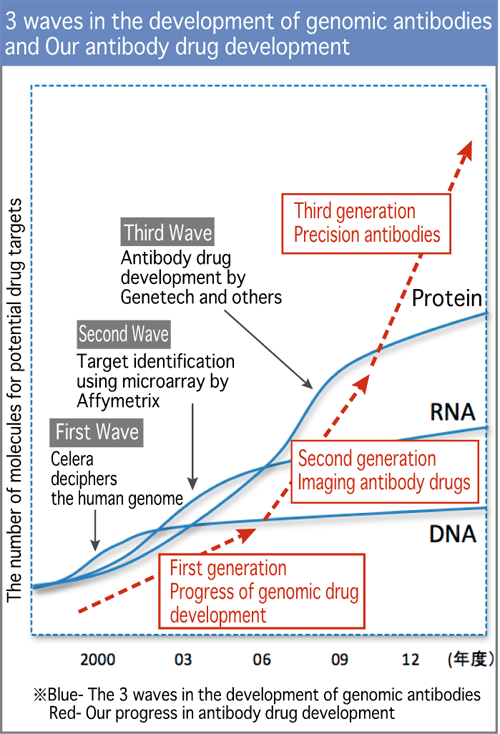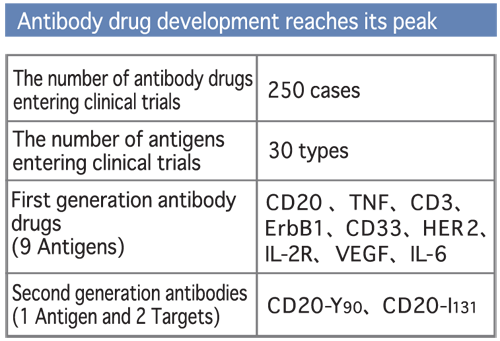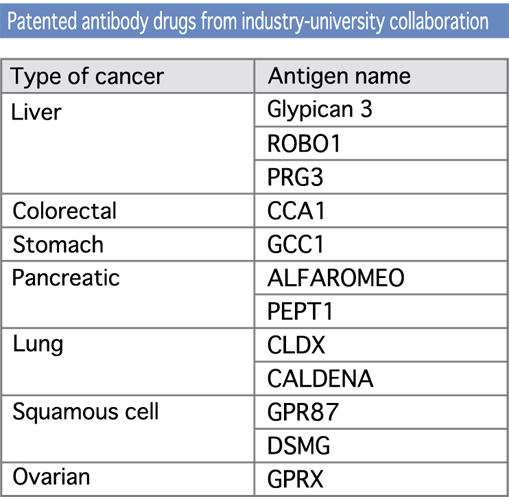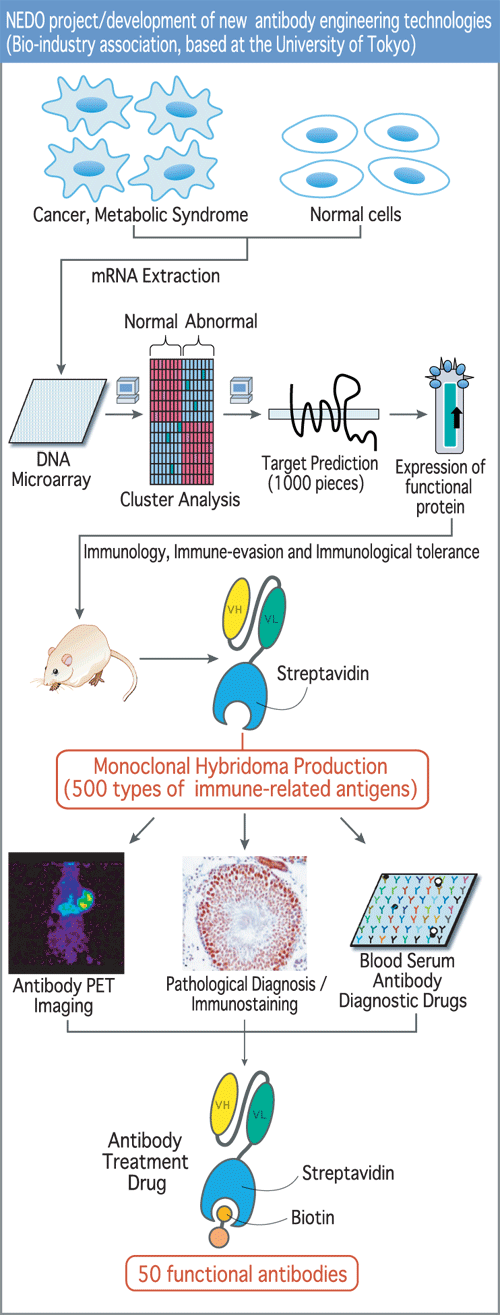
Among pharmaceutical drugs, the antibody drug market has rapidly grown in the 21st century and has become the driving force for the biotechnology industry. The market has grown to about 40 billion dollars worldwide, and growth is expected to continue to 100 billion dollars. The development race for antibody drugs is referred to as the showdown race for the pharmaceutical industry. (Diagram 11)
Until now, there have been 250 clinical trials of antibody drugs . Only 30 antigens (target molecules) have been used . The success is limited to nine first generation antibodies and one second generation antibody . Technical innovations to improve antibody engineering are essential. (Diagram 12)
Until now, there have been 250 clinical trials of antibody drugs . Only 30 antigens (target molecules) have been used . The success is limited to nine first generation antibodies and one second generation antibody . Technical innovations to improve antibody engineering are essential. (Diagram 12)
advances in practical applications, and research contributions
Professor Tatsuhiko Kodama at The University of Tokyo and Dr. Yamazaki of Chugai Pharmaceutical Co., Ltd., are principal investigators of MDADD, and have initiated the research on genome-based antibody drugs. The search for cancer-specific antigen targets using Affymetrix microarray technology was started in 1999. Cancer tissue samples have been deposited by The University of Tokyo Hospital. In 2001, they began to the systematic production of monoclonal antibodies for cancer cell-specific membrane proteins, a project funded by NEDO (New Energy and Industrial Technology Development Organization). While other genome drug projects struggle to identify target proteins, our research team has a strategic advantages in finding the targets. As early as 2002, we have generated an anti-glypican 3 antibody for liver cancer treatment. The technology has since transferred to Chugai Pharmaceutical Co., Ltd.. The product is under clinical trials overseas. It is expected that this anti-glypican antibody will provide an innovative cancer therapy. (Diagram 13)
Although it is difficult to express cell membrane protein, Dr. Hamakubo, a team leader of antigen development, developed the technology for expressing membrane protein on the surface of a baculovirus during his research (patented in 2002) . Using this technology, he established the technique to generate antibodies with high affinity and specificity toward cell membrane antigens. (Diagram 14)
Currently, the research is centered is at RCAST, the University of Tokyo . The research group consists of 24 people involved in: engineering of baculoviruses (5 people), cell fusion (4 people), antibody evaluation (ELISA 3 people, FACS & western 6 people), mass spectrometry (3 people), membrane protein functional analysis (3 people) . The research groups work together as a team to engineer antigens and antibodies with high precision and rigorous quality control . The funding from the NEDO project has made it possible to generate one hundred specific monoclonal antibodies per year.
We have engineered monoclonal antibodies for 500 disease-related antigens through industry and university collaboration, which is the largest scale in the world . We obtained patents for a total of 12 different therapeutic antibodies for seven types of cancer and are very proud of our world class achievement.
The HUPO (Human Proteome Organisation) antibody project, based in Europe, began around the same time . They produced polyclonal antibodies by immunizing rabbits with peptides . Compared to their project, we are leading the way with a significantly higher number of patents, practical applications, and research contributions
We have succeeded in PET imaging using a ROBO1 pre-targeting drug in collaboration with Chugai Pharmaceutical Co., Ltd. and Fujifilm . Additionally, we are about to change the strategy for treatment of liver cancer with overseas clinical trials for the anti-glypican 3 antibody by Chugai Pharmaceutical Co., Ltd..
During the process of antibody drug development, researchers often encounter major problems and many projects fail before completion . Although a candidate target looks promising at the beginning of the gene mining step, common problems are the difficulty in expressing the target antigen with the correct conformation and also engineering the antibody for drug development . Therefore, we should not attempt to develop cancer treatment drugs with a single target . The key to success in developing new antibody drugs, is to search target antigens and develop antibody drugs as a continuous process.
Although it is difficult to express cell membrane protein, Dr. Hamakubo, a team leader of antigen development, developed the technology for expressing membrane protein on the surface of a baculovirus during his research (patented in 2002) . Using this technology, he established the technique to generate antibodies with high affinity and specificity toward cell membrane antigens. (Diagram 14)
Currently, the research is centered is at RCAST, the University of Tokyo . The research group consists of 24 people involved in: engineering of baculoviruses (5 people), cell fusion (4 people), antibody evaluation (ELISA 3 people, FACS & western 6 people), mass spectrometry (3 people), membrane protein functional analysis (3 people) . The research groups work together as a team to engineer antigens and antibodies with high precision and rigorous quality control . The funding from the NEDO project has made it possible to generate one hundred specific monoclonal antibodies per year.
We have engineered monoclonal antibodies for 500 disease-related antigens through industry and university collaboration, which is the largest scale in the world . We obtained patents for a total of 12 different therapeutic antibodies for seven types of cancer and are very proud of our world class achievement.
The HUPO (Human Proteome Organisation) antibody project, based in Europe, began around the same time . They produced polyclonal antibodies by immunizing rabbits with peptides . Compared to their project, we are leading the way with a significantly higher number of patents, practical applications, and research contributions
We have succeeded in PET imaging using a ROBO1 pre-targeting drug in collaboration with Chugai Pharmaceutical Co., Ltd. and Fujifilm . Additionally, we are about to change the strategy for treatment of liver cancer with overseas clinical trials for the anti-glypican 3 antibody by Chugai Pharmaceutical Co., Ltd..
During the process of antibody drug development, researchers often encounter major problems and many projects fail before completion . Although a candidate target looks promising at the beginning of the gene mining step, common problems are the difficulty in expressing the target antigen with the correct conformation and also engineering the antibody for drug development . Therefore, we should not attempt to develop cancer treatment drugs with a single target . The key to success in developing new antibody drugs, is to search target antigens and develop antibody drugs as a continuous process.




